Skip to comments.
What You Get Is What You See
Notes of an Anesthesioboist ^
| August 27, 2007
| T.
Posted on 09/04/2011 12:55:20 PM PDT by Alex Murphy
One time I was doing post-op rounds, dressed in regular / street clothes but with my hospital ID around my neck. One of the women I was visiting spoke only Spanish and was in the midst of sharing a very painful, personal story with me when a medical team of some kind walked in, also on rounds. I was sitting at eye-level with my patient, speaking Spanish to her in a low voice when the group walked in: an elderly male physician in a long white coat; a younger woman, also in a white coat; and a young man, probably a student or a resident, in a short white jacket. The woman in the white coat looked at us for a moment, then turned to me and said in a loud voice, in an exaggeratedly deliberate pace, "HI. We're from ONC-OL-O-GY. Do YOU speak ENG-lish?!"
For a moment I looked at her in a state of complete confusion. Do I speak English? I work here! I thought. My mind raced through why this woman was speaking to me as if I were both deaf and uncomprehending. I don't even LOOK like I come from a Spanish-speaking country - or do I? I've always thought I was too Asian-looking to be mistaken for Latin American, though I've seen some Latin Americans that I've actually mistaken for Filipino, so I suppose the lady wasn't way off-base.
Anyway, we got that sorted out, but it made me realize how easy it is to fail the Rorschach tests we get all the time in day-to-day life.
***
 Here's what I've learned so far about interpreting the world: Every social exchange or situation is a Rorschach test. The way you read - or, the way you rewrite for yourself the story you hear or see, the life of the other person, the meaning of what's in front of you - says more about you than about the "text" or "inkblot" you're interpreting. Mauriac explored this idea in the novel I just finished (Vipers' Tangle): the kind of reader you are is the kind of person you are. Character and interpretation of meaning are interconnected.
Here's what I've learned so far about interpreting the world: Every social exchange or situation is a Rorschach test. The way you read - or, the way you rewrite for yourself the story you hear or see, the life of the other person, the meaning of what's in front of you - says more about you than about the "text" or "inkblot" you're interpreting. Mauriac explored this idea in the novel I just finished (Vipers' Tangle): the kind of reader you are is the kind of person you are. Character and interpretation of meaning are interconnected.
Making assumptions is human nature and often a necessary part of arriving at some kind of understanding of a person or situation. Assumptions fill in the gaps. It's a well-known phenomenon that, given part or parts of a particular recognizable whole, the human brain fills in details so as to create for itself something it can perceive and interpret. I think that among our faults and failings as human beings, making some wrong assumptions is one of the most understandable, and perhaps one of the most insidious.
The one example I'll never forget of a doctor making assumptions about a patient - and getting the "inkblot" all wrong, because yes, there was a right answer and a wrong answer - also concerns a patient who was a native speaker of Spanish. I will call him Juan de la Cruz, in honor of the great Spanish mystic.
I was a resident assigned to provide anesthesia for Juan de la Cruz. I won't say what type of surgery he was about to have, but I will say that it was a somewhat unusual procedure, one you don't see every day in the O.R. I'll call it the Calvary Procedure, not because it involved a lot of suffering, but because the name reminds me of something in the procedure.
As I was looking over Juan's chart I noticed under the heading "Social History" something like this, after a description of his smoking and drinking habits and marital status: was a physician in his native country; currently works as a building custodian.
My heart ached to learn this, but I had a more practical problem at hand: should I address him by his earned title, "Dr.," and take the risk of dredging up a possibly painful past or of sounding insincere, or call him "Mr.," and take the risk of sounding condescending or disrespectful?
I don't remember how I handled the conversation. I remember our preop conversation only the way one remembers a hazy dream just at the edge of being forgotten. My memory cuts to the O.R., then, after I've induced general anesthesia for Juan, and someone asks me to say the final procedure verification out loud. I say, "This is Dr. Juan de la Cruz for a Calvary Procedure."
The attending surgeon was a woman with an Eastern European name but the accent and affectations of someone whose illustrious parents had sent her to study at Oxford or Cambridge. She was smug and imperious, and she turned to me with a look of annoyance when I said this. "He's not a doctor, he's a JANITOR."
I was a resident, but I wasn't her resident. I looked into her eyes and said, "He may be a janitor now, but he was a physician in his own country."
The lady surgeon appeared irate and protested again at the idea that Juan should be anything other than a janitor. Then she added, "He never told me that. Where are you getting this information?"
"From the chart," I said somewhat curtly. I wanted to ask if she'd even bothered to read it. Her tone and arrogant air and faux British accent were getting to me.
"Well," she muttered. "Goodness knows what it means to be a 'physician' in his country."
That pretty much killed the conversation in the O.R. for a while.
I knew I was supposed to learn something, a bunch of things, from the interaction, and I chewed on that exchange for a long while. One thing I needed to work on was to avoid letting snobby people get to me. But the more important lesson, I think, was again a lesson about human worth: how we judge others, the assumptions we make (or fail to make) about the stories that underlie human faces and circumstances, if and how we even see our fellow human beings.
We're surrounded by inkblots, texts, stories, mysteries. Someone please remind me every day to make the effort to read, and to practice good reading - the lectio divina of life.
TOPICS: General Discusssion; Moral Issues; Religion & Culture
KEYWORDS: analysis; insight; lordloveaduck; rorschach
Here's what I've learned so far about interpreting the world: Every social exchange or situation is a Rorschach test. The way you read - or, the way you rewrite for yourself the story you hear or see, the life of the other person, the meaning of what's in front of you - says more about you than about the "text" or "inkblot" you're interpreting. Mauriac explored this idea in the novel I just finished (Vipers' Tangle): the kind of reader you are is the kind of person you are. Character and interpretation of meaning are interconnected. Making assumptions is human nature and often a necessary part of arriving at some kind of understanding of a person or situation. Assumptions fill in the gaps. It's a well-known phenomenon that, given part or parts of a particular recognizable whole, the human brain fills in details so as to create for itself something it can perceive and interpret. I think that among our faults and failings as human beings, making some wrong assumptions is one of the most understandable, and perhaps one of the most insidious....
....the more important lesson, I think, was again a lesson about human worth: how we judge others, the assumptions we make (or fail to make) about the stories that underlie human faces and circumstances, if and how we even see our fellow human beings. We're surrounded by inkblots, texts, stories, mysteries. Someone please remind me every day to make the effort to read, and to practice good reading - the lectio divina of life.
To: Alex Murphy
Another interesting exchange is when a PhD in a physical science or engineering interact with a Medical Doctor.
To: All
 Court Psychiatrist
Court Psychiatrist: [Holding up inkblot card] Okay, now tell me what you see, Alan.
Alan Musgrave: Flowers. Hmmm...tulips, jonquils, and roses. They're long-stemmed American Beauty roses, actually.
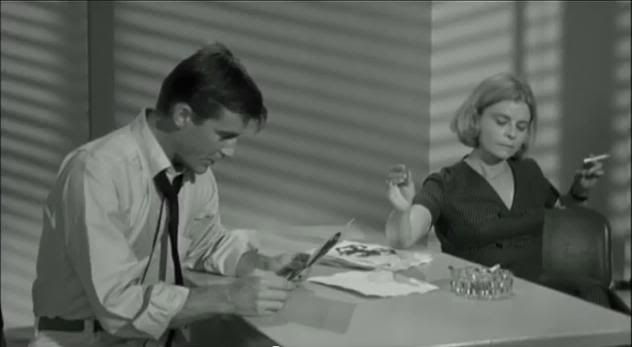 Court Psychiatrist
Court Psychiatrist: [flipping to new inkblot card, irritated] Uh - concentrate. Try a little harder.
Alan Musgrave: [sharply inhaling]. Birds. Trees. [Sudden interest, taking card from psychiatrist] Oh, and there's a river! A river, winding lazily through green pastures....
Court Psychiatrist: [interrupting] You're fighting me.
Alan Musgrave: [continuing] ....oh, it's so peaceful. On the banks are happy children....
Court Psychiatrist: [ignoring him, filing her nails] Don't fight me, Alan.
Alan Musgrave: [continuing]....clouds, lots of clouds -- [gets out of chair and sits on desk, showing inkblot to psychiatrist] Look! One of them looks just like the Easter Bunny! Huh.
Court Psychiatrist: [takes inkblot from him, looks him in the eye, condescending] Alan, I want to help you. Now, don't you realize that these things are supposed to be dirty?
Alan Musgrave: [Surprised] Dirty? [Looks at new inkblot card, shakes head] No. That's a butterfly. A brightly colored butterfly....
 Court Psychiatrist
Court Psychiatrist: [leaps up from desk, throws all inkblots at Alan in extreme anger] You are hostile! You are hostile, you little creep! You creep, you hostile creep!
Alan Musgrave: Shhhhh! Doctor, shhhhh! [motions with hand to sit down] Doctor, what are you hiding from? Your whole pattern suggests a rigidity syndrome of severe underlying anxiety, massive repressions and pathological prejudices. All of which makes it very difficult for me to relate to you! So if you really want me to talk, get me my tape recorder.
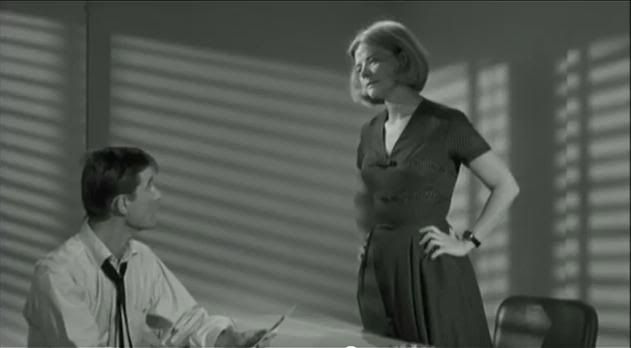 Court Psychiatrist
Court Psychiatrist: [steaming] Anything else?
Alan Musgrave: Now that you mention it, you might get me my transistor radio. And a corned beef sandwich. On rye. No mustard.
-- from the 1966 movie
Lord Love A Duck
3
posted on
09/04/2011 1:18:05 PM PDT
by
Alex Murphy
(Posting news feeds, making eyes bleed: he's hated on seven continents)
To: Alex Murphy
Thank you for this interesting article. Here's another back at you:
The Illusion of Asymmetric Insight. The basic idea is that everyone believes they know and understand more about other individuals than those individuals know and understand about them.
4
posted on
09/04/2011 1:19:35 PM PDT
by
AZLiberty
(No tag today.)
To: Alex Murphy
I cherrish my occupation of the last three years. I “used” to be a wet chemist - you know, the kind that works with strong chemicals that will burn holes in your face, hands, or lungs, in a manufacturing atmosphere of time crunch pressures. I worked without gloves as they would provide a false sense of protection (in getting torn).
Now I teach (I’m a father) homeschooling my three boys.
Buying the house, getting the drivers liscense, going to the doctor, at church - I’m the “not gainfully employed” home maker.
I love this occupation as much as the other. I love it like my mother loved being a home maker for her family. And mostly, I love being humble(humiliated by this world’s understanding) doing what Jesus has asked me to do.
To: Alex Murphy
Is the inkblot really supposed to be something dirty? Because I don’t see it.
6
posted on
09/04/2011 4:29:17 PM PDT
by
Celtic Cross
(The brain is the weapon; everything else is just accessories. --FReeper Joe Brower)
To: Celtic Cross
Well, the paper is. It’s got a messy inkblot on it.
7
posted on
09/04/2011 6:10:41 PM PDT
by
Erasmus
(I love "The Raven," but then what do I know? I'm just a poetaster.)
To: AZLiberty
8
posted on
06/13/2013 2:54:19 PM PDT
by
metmom
(For freedom Christ has set us free; stand firm therefore & do not submit again to a yoke of slavery)
To: metmom
Thank you for pinging me to this interesting and ancient thread, but I have no idea why.
9
posted on
06/13/2013 3:16:40 PM PDT
by
AZLiberty
(No tag today.)
To: AZLiberty
Someone posted a link to it on another thread and I followed that.
10
posted on
06/13/2013 3:26:47 PM PDT
by
metmom
(For freedom Christ has set us free; stand firm therefore & do not submit again to a yoke of slavery)
To: Alex Murphy
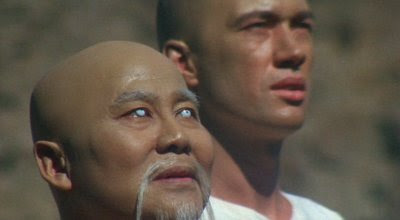
The falcon's tail, is the clown's mohawk
11
posted on
06/30/2013 7:28:19 AM PDT
by
BlueDragon
(signed, Tommy (how do you think he does it I don't know what makes his so good))
To: BlueDragon
The falcon's tail, is the clown's mohawk 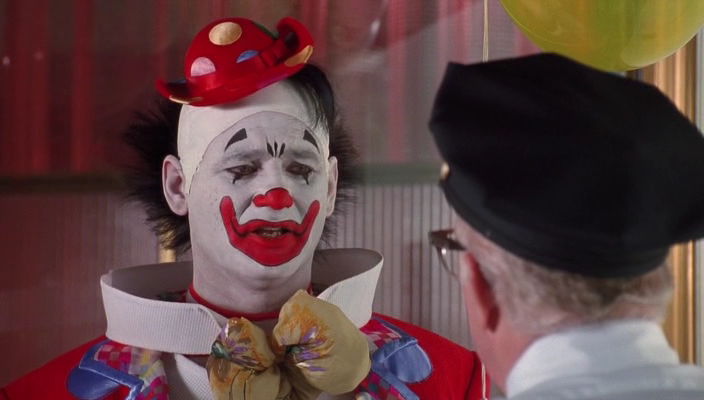
Security Guard: “What the hell kind of clown are you?”
Grimm: “The crying on the inside kind, I guess.”
To: Alex Murphy
ain't that the truth.
Why oh why do so many otherwise intelligent people ride the shortbus to the RF?
The window licking isn't clarifying the "view", it's just smudging the windows.
We have cereal killers, the wanna-be martyr types (being martyred would prove the correctness of their persistent and stubbornly clung to error -- Saundra Duffy Lives!) the holy hand grenade hurlers, the mine-layers & sappers, old-fashioned Pharisees, new-fangled Pharisees, the semi-disinterested and the fully disinterested, along with a few cross bearers like this guy who I am fairly well certain himself would want no part of yet another round of "let's crucify the religion moderator".
Matt.15:39 And when the centurion, which stood over against him, saw that he so cried out, and gave up the ghost, he said, Truly this man was the Son of God.
[whom we have killed]
13
posted on
06/30/2013 9:38:43 AM PDT
by
BlueDragon
(it's enough to make a ANY clown cry)
To: BlueDragon
And when the centurion, which stood over against him, saw that he so cried out, and gave up the ghost, he said, Truly this man was the Son of God. It works best when you say it in John Wayne's voice.

To: Alex Murphy
I'm having trouble imagining John Wayne as a Roman soldier, or putting his voice into that scene, at the foot of the cross, once the sky was darkened for hours.
Is there some movie I missed?
Before there were movies...they didn't have any. (there, let's see someone contest that statement.lol)
But, there were historians, or chroniclers as a few were called.
http://www.textexcavation.com/phlegontestimonium.html has some discussion of Phlegon's account of the sun being darkened, as reference to it survived and was discussed by a few others. It seems fairly solid.
To: BlueDragon
I'm having trouble imagining John Wayne as a Roman soldier, or putting his voice into that scene, at the foot of the cross, once the sky was darkened for hours. Is there some movie I missed? "Missed" might be an exaggeration. Beautifully shot, but abysmally written, it's The Greatest Story Ever Told.
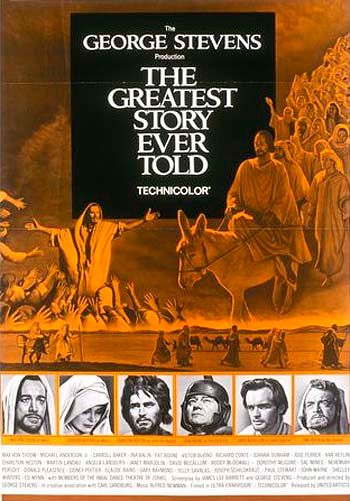
Disclaimer:
Opinions posted on Free Republic are those of the individual
posters and do not necessarily represent the opinion of Free Republic or its
management. All materials posted herein are protected by copyright law and the
exemption for fair use of copyrighted works.
FreeRepublic.com is powered by software copyright 2000-2008 John Robinson
 Here's what I've learned so far about interpreting the world: Every social exchange or situation is a Rorschach test. The way you read - or, the way you rewrite for yourself the story you hear or see, the life of the other person, the meaning of what's in front of you - says more about you than about the "text" or "inkblot" you're interpreting. Mauriac explored this idea in the novel I just finished (Vipers' Tangle): the kind of reader you are is the kind of person you are. Character and interpretation of meaning are interconnected.
Here's what I've learned so far about interpreting the world: Every social exchange or situation is a Rorschach test. The way you read - or, the way you rewrite for yourself the story you hear or see, the life of the other person, the meaning of what's in front of you - says more about you than about the "text" or "inkblot" you're interpreting. Mauriac explored this idea in the novel I just finished (Vipers' Tangle): the kind of reader you are is the kind of person you are. Character and interpretation of meaning are interconnected. 






